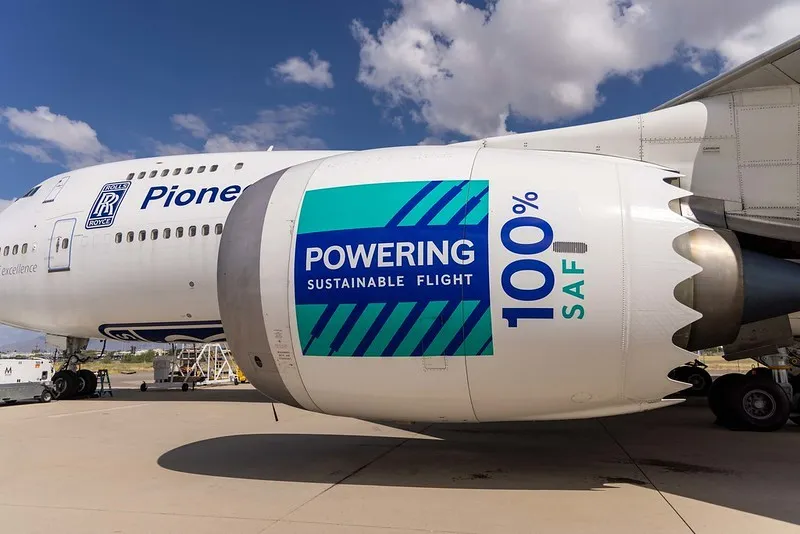
Rolls-Royce Trent 1000 passes 100% sustainable fuel test
Oct 20, 2021

The Rolls-Royce Trent 1000 engine has successfully completed tests utilizing 100% sustainable aviation fuel, marking a significant milestone in the aviation industry’s efforts to reduce carbon emissions. This achievement demonstrates the engine's compatibility with environmentally friendly fuels, which can help mitigate the impact of air travel on climate change. The test is part of Rolls-Royce's broader commitment to sustainability and innovation in aviation technology, aiming to support global efforts for a more sustainable future. The successful performance of the Trent 1000 with sustainable fuel showcases the potential for cleaner, more efficient air travel options moving forward.
The Rolls-Royce Trent 1000 has recently achieved a significant milestone by successfully passing tests with 100% sustainable aviation fuel (SAF). This achievement not only highlights the capabilities of modern jet engines but also underscores the aviation industry's commitment to reducing its carbon footprint. As global awareness of climate change grows, the need for sustainable practices in aviation has become increasingly critical. The Trent 1000, known for its efficiency and reliability, is now leading the way in sustainable aviation technology.
Understanding Sustainable Aviation Fuel (SAF)
Sustainable aviation fuel is a biofuel made from sustainable resources. Unlike traditional jet fuels derived from fossil fuels, SAF can significantly reduce greenhouse gas emissions. The use of SAF in commercial aviation is a crucial step towards achieving net-zero carbon emissions by 2050, as outlined by many leading airlines and aviation authorities.
The Importance of the Trent 1000 Engine
The Rolls-Royce Trent 1000 engine is primarily used in the Boeing 787 Dreamliner. Its design incorporates advanced technology that optimizes performance while minimizing environmental impact. The Trent 1000 has consistently proven its reliability and efficiency, making it a popular choice among airlines operating the Dreamliner.
Key Statistics on the Trent 1000 and SAF Testing
To better understand the impact of the Trent 1000's successful tests with 100% SAF, the following table summarizes key statistics:
| Parameter | Value |
|---|---|
| Engine Model | Rolls-Royce Trent 1000 |
| Fuel Type | 100% Sustainable Aviation Fuel |
| Emission Reduction | Up to 80% lower lifecycle emissions |
| Test Duration | Multiple flight hours |
| Aircraft Type | Boeing 787 Dreamliner |
Environmental Impact of the Trent 1000 with SAF
The successful testing of the Trent 1000 with 100% SAF marks a pivotal moment in the aviation sector. By utilizing sustainable fuels, airlines can drastically reduce their carbon emissions. The use of SAF can lead to up to 80% lower lifecycle emissions compared to conventional jet fuel, making it a game-changer in the pursuit of greener aviation practices.
Industry Response and Future Prospects
The aviation industry has reacted positively to the Trent 1000's achievement. Airlines and manufacturers are increasingly recognizing the importance of transitioning to sustainable fuels. The successful testing serves as a catalyst for further research and development in the field of SAF, encouraging more airlines to explore sustainable options.
Conclusion: A Step Towards Greener Aviation
In conclusion, the Rolls-Royce Trent 1000's successful tests with 100% sustainable aviation fuel represent a significant milestone in the aviation industry. As we move towards a more sustainable future, innovations like these are crucial in addressing climate change and reducing the environmental impact of air travel. The Trent 1000 is not only an engineering marvel but also a beacon of hope for a greener aviation sector.
FAQs about the Rolls-Royce Trent 1000 and Sustainable Aviation Fuel
Here are some common questions regarding the Trent 1000 engine and sustainable aviation fuel:
| Question | Answer |
|---|---|
| What is the Trent 1000? | It is a turbofan engine designed and manufactured by Rolls-Royce for the Boeing 787 Dreamliner. |
| What is sustainable aviation fuel? | SAF is a biofuel that is produced from sustainable resources, aiming to reduce greenhouse gas emissions in aviation. |
| How does SAF reduce emissions? | SAF can significantly lower lifecycle emissions compared to traditional fossil fuels, offering a more environmentally friendly alternative. |
| Why is the Trent 1000 important for the future of aviation? | The Trent 1000's successful testing with 100% SAF sets a precedent for future engines, demonstrating that sustainable options are viable. |
As the industry progresses, the integration of sustainable aviation fuel into commercial operations will be essential. The Rolls-Royce Trent 1000's successful tests are a promising step in the right direction, paving the way for a more sustainable future in aviation.
Related Articles

Explore Thailand: The Best Islands to Visit for Paradise, Adventure, and Relaxation

The Ultimate Guide to the Best Islands in Thailand for Your Next Getaway

Do babies need passports? How to get a passport for a newborn

How to get a U.S. passport fast: here’s how to expedite the process

What is Mobile Passport Control: 5 reasons why you should use it

SENTRI vs. Global Entry: A detailed guide

Do you need a passport to go to the Bahamas? Let’s find out

Do you need a passport to go to Mexico? A detailed guide

Do you need a passport to go to Canada? We got the answer

Do You Need a Passport for a Cruise: An Essential Travel Guide

Booster Seat Requirements: All the Rules to Follow in Your Rental Car

What Are the World’s Most Powerful Passports, and How Does Yours Rank?

How to Take a Passport Photo at Home: A Helpful Guide

You've got to have heart! Southwest's new livery

Your opinion: Should water be free on low cost carriers?

Young women bolder than guys as solo travellers
